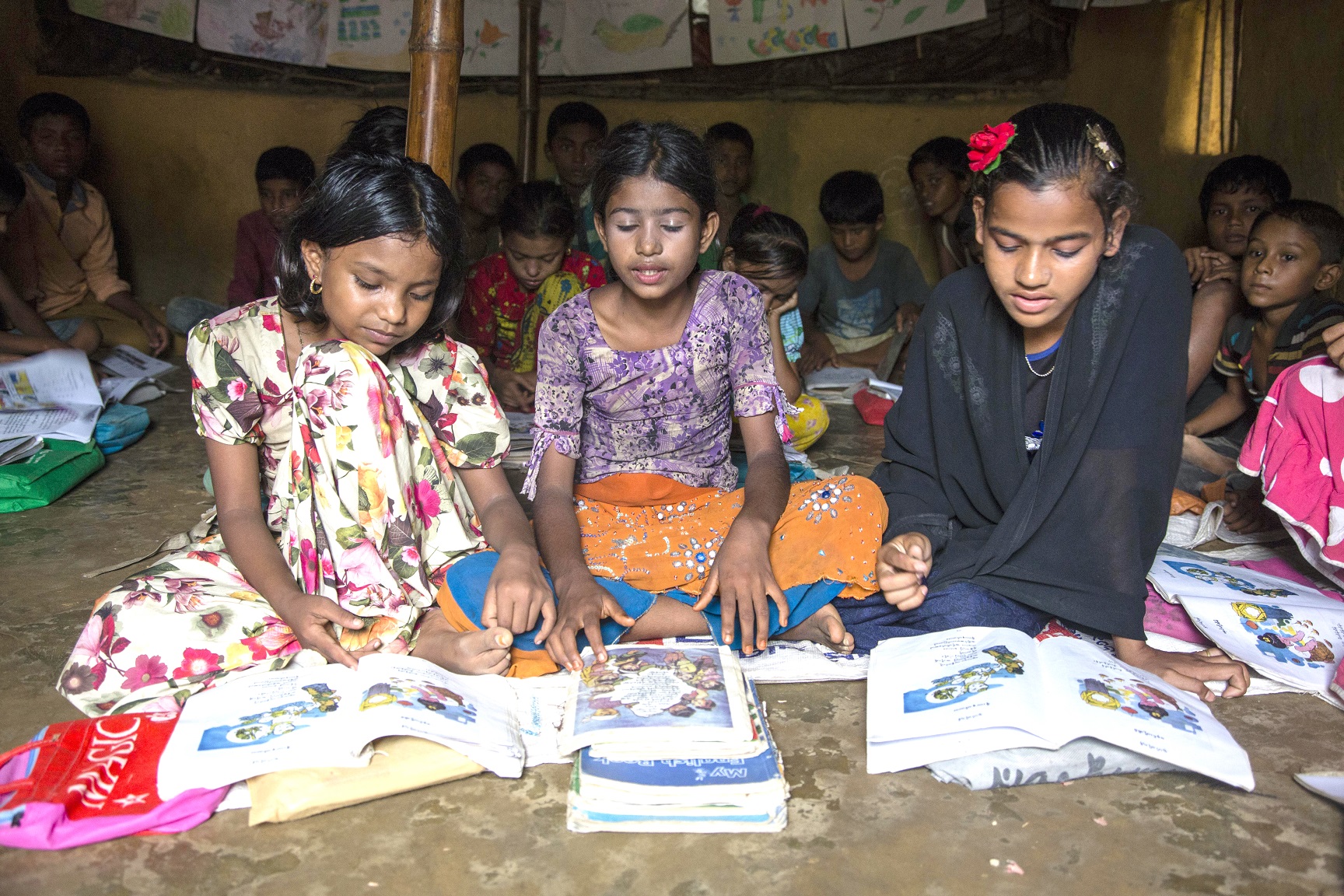Originally published at Asian Correspondent on 7th February 2018
OF the 700,000 Rohingya who have fled to Bangladesh, escaping a vicious campaign of ethnic cleansing in Western Burma, there are 450,000 children, most of whom had been denied a formal education under Burma’s system of apartheid.
With the help of non-government organisations and aid groups which work in Bangladesh’s sprawling refugee camps, some of these children are getting a chance to attend makeshift schools, and begin learning basic numeracy and literacy.
Since 2012, when Burma’s government imposed a system of racial segregation across Rakhine State, Rohingya children have struggled to attend school. The few schools at which Rohingya children could attend were drastically overcrowded, with as many as 90 students per class, and inadequately equipped, with insufficient desks, chairs, textbooks and teaching resources.
Due to overcrowding, students could only attend school for a maximum of half a day, with schools operating two study sessions – a morning session for one group of students and an afternoon session for another. In these schools, students were not allowed to learn Bengali, the language which the Rohingya dialect is based upon.
It’s estimated that 60,000 Rohingya children remain stranded in squalid camps in Western Burma, where they have little or no access to formal education, while a far greater number of children fled the country following Burma’s brutal military offensive against the ethnic Muslim minority.
As thousands of Rohingya children arrive in Bangladesh after a long and arduous journey, aid organisations have been striving to provide safe spaces for them to rest and play. These safe spaces are essential to help children cope with the trauma they’ve experience, as Marzia Dalto, UNHCR’s Protection Officer in Cox’s Bazar explains:
“Play is essential for all children to build a foundation for learning, but it is particularly important for refugee children because of its therapeutic role. When properly managed, safe and imaginative play can help to reduce stress and optimise brain development.”
“It can provide healing opportunities for children’s emotional trauma and offer hope to break the cycle of physical and emotional violence.”
Children on the Edge, a non-profit child protection organisation which for the past seven years has been providing schools for Rohingya refugee children, reports that the many of the children they’re helping hadn’t been to school before. Those who had, said their teachers regularly didn’t show up. Few of these children are able to read or do simple mathematics.
Since 2010, Children on the Edge has established 45 schools within the Kutupalong camp. These schools now “double up” as safe spaces for the hundreds of Rohingya children who have been arriving each day. Many of these children have witnessed first-hand the beatings, executions and gang-rapes which Burma soldiers have inflicted on the Rohingya populace during their land clearance operations.
Staff at these centres create safe environments where children can forget where they are and what they have been through. As Ayasha, a teacher in the camp explains:
“As the teacher, we need to show them a smile every day. This will make the centre feel like a happy place for them. And then they want to come back again the next day.”
“We don’t talk about negative experiences. It’s too soon, We only try to give them a happy place to come”.
While in school, children are focused on songs, learning, educational games and drawing activities, rather than the ordeals they have recently experienced. The children’s sense of contentment is illustrated by seven-year-old student, Sofaya, “I like when my teacher plays games with us. She is fun to play with. She makes me feel better when I am sad. I like to skip rope. I learned to jump rope at the centre. It’s a very fun way to spend time. My teacher even tries to jump rope too sometimes!”
Schools and child-friendly safe spaces help improve children’s general well-being and provide parents with the opportunity to collect water, food, firewood and resources for their shelter, without having to worry about their children’s safety.
Refugee children who do not have regular access to a school or a child-friendly safe space, are at greater risk of being victims of violence, abuse, sexual exploitation, child marriage, child labour and human trafficking. With human trafficking gangs working in refugee camps to traffic young girls into sexual slavery, schools provide an essential social support network which can protect these vulnerable children.
In an effort to establish a sufficient number of schools and safe spaces for the 450,000 Rohingya children now living in refugee camps along the Bangladesh-Burma border, Unicef has announced an ambitious plan to increase the number of learning centres from 182 to 1,500 centres, which will be able to cater for 200,000 children.
Children on the Edge has begun establishing a further 150 new classrooms, which will enable the organisation to provide education to a total of 8,400 children.
“It is critical that these children who have suffered so much in this crisis, should have access to education in a safe and nurturing environment,” Unicef Representative in Bangladesh Edouard Beigbeder said.
“This is critical not just to provide them with a much-needed sense of normalcy now, but so that they can build a future to look forward to.”
Children at these learning centres will study numeracy, literacy, science and arts as well as safety, hygiene and practical life skills. Following the traumatic events they have lived through, the promise of an education does provide them with a glimmer of hope for the future.
Exactly how long the Rohingya children will be living in these refugee camps remains to be seen.
Bangladesh and Burma have reached a controversial repatriation agreement, but without Burmese leaders altering their disdain towards the “illegal Bengali immigrants”, it’s completely unrealistic to believe the Rohingya will be able to safely return home, keeping the Rohingya children in exile for many years to come.
